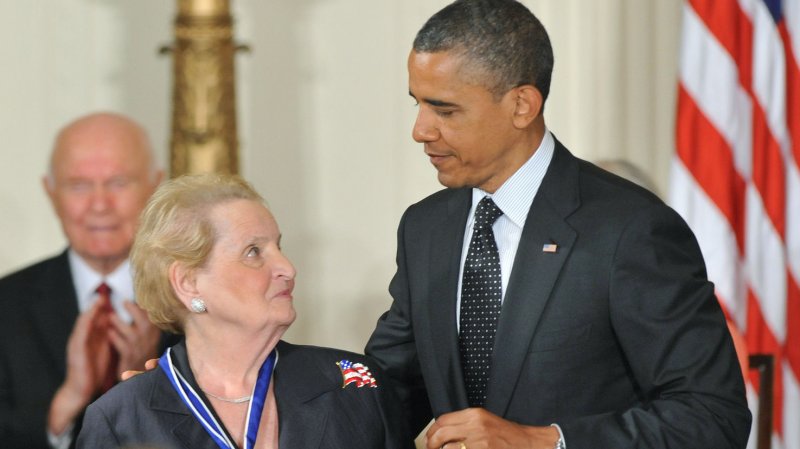1 of 22 | President Barack Obama awards the the Presidential Medal of Freedom to former Secretary of State Madeleine Albright during a ceremony in the East Room at the White House in Washington on May 29, 2012. The Medal of Freedom is our NationÕs highest civilian honor, presented to individuals who have made especially meritorious contributions to the security or national interests of the United States, to world peace, or to cultural or other significant public or private endeavors. UPI/Kevin Dietsch |
License Photo
At the White House Tuesday afternoon, President Obama awarded 13 individuals the Presidential Medal of Freedom, the nation's top civilian honor, to those "who have made especially meritorious contributions to the security or national interests of the United States, to world peace, or to cultural or other significant public or private endeavors."
This year's awardees are:
Madeleine Albright
Former Secretary of State Madeleine Albright was the first woman to hold that position. As secretary, she worked with NATO to combat ethnic cleansing in the Balkans and the spread of nuclear weapons across the globe. She is a professor at Georgetown University, an author of five books, chairs the National Democratic Institute and is the President of the Harry S. Truman Scholarship Foundation.
Bob Dylan
Over a career spanning 50 years, Bob Dylan won 11 Grammys, wrote more than 600 songs and released 34 studio albums. His work had significant impact on the civil rights movement of the 1960s, and his songs have been recorded more than 3000 times by other artists.
John Glenn
Astronaut, Senator and United States Marine Corps pilot John Glenn was the first American in space, the first American to orbit the earth, and at 77, became the oldest person to visit space. He was elected to the U.S. Senate in Ohio in 1974, and helped design the 1978 Nuclear Nonproliferation Act. He has also received the Congressional Gold Medal and the Congressional Space Medal of Honor.
Dolores Huerta
Dolores Huerta was influential in advocating for the civil rights of agricultural workers and women, helping to secure the passage of California's Agricultural Labor Relations Act of 1975 and disability insurance for farmworkers in California. She co-founded the National Farmworkers Association, later the United Farm Workers of America with Cesar Chavez, and the Dolores Huerta Foundation. She has also received the Eleanor Roosevelt Award for Human Rights.
Juliette Gordon Low
Juliette Gordon Low Founded the Girl Scouts in 1912 to teach girls self-reliance and resourcefulness. Since its founding Girl Scouts has grown to over 50 million members, the largest organization for girls. Low died in 1927.
Toni Morrison
The first woman to win a Nobel Prize, Toni Morrison is the author of some of the nation's most celebrated novels, including "Song of Solomon," "Jazz," and the Pulitzer Prize-winner, "Beloved." She created the Princeton Atelier at Princeton University to bring together aritists and students.
Shimon Peres
President of Israel Shimon Peres has been one of the foremost advocates for Israel's peace and security. He was twice Prime Minister, as well as serving as Foreign Minister and Minister of Defense. Peres, with then-Prime Minister Yitzhak Rabin and PLO Chairman Yassar Arafat, won the Nobel Peace Prize in 1994 for his efforts to bring peace between Israel and Palestinians in the talks that led to the Oslo Accords.
John Paul Stevens
Supreme Court Justice John Paul Stevens is the third longest-serving Justice in the Court's history. Nominated by President Gerald Ford, Stevens is known for his independent and pragmatic approach to judging. His opinions have significantly impacted the understanding of civil rights, the First Amendment, the death penalty, administrative law and the separation of powers. Stevens is a naval veteran of World War II and received the Bronze Star for his service.
Pat Summitt
Pat Summitt, University of Tennessee women's basketball coach, is the all-time winningest leader among all NCAA basketball coaches. She was named the Naismith Women's Collegiate Coach of the Century and took her Lady Vols to more Final Four appearances in history. The Pat Summitt Foundation will make grants to advocates fighting against Alzheimer's and early onset dementia.
John Doar
Assistant Attorney General in charge of the Civil Rights Division of the Department of Justice, who fought to enforce civil rights in the 1960s, John Doar was known for bringing such notable cases as convictions for the 1964 murders of three Mississippi civil rights workers and working to implement the Voting Rights Act in 1965. He helped in the investigation of the Watergate scandal.
William Foege
A physician and epidemiologist who helped eradicate smallpox in the 1970s, Foege was the director of the Centers for Disease Control and Prevention and founded the Task Force for Child Survival. He serves as a senior fellow at the Carter Center, working with, among others, the Bill and Melinda Gates Foundation to champion health issues across the globe.
Gordon Hirabayashi
Although he became a sociology professor, Gordon Hirabayashi was is best known for his work as an advocate who openly defied the internment of Japanese Americans during World War II. He refused to report for evacuation, instead turning himself in to the FBI, after which he was convicted by a federal district court for defying the exclusion order. The conviction was ultimately overturned by a U.S. Court of Appeals, even after it was upheld by the Supreme Court.
Jan Karski
An officer of the Polish Underground during World War II, Jan Karski was among the first to share with the world his eye-witness account of the Holocaust when he met with the Polish government-in-exile in London and with President Roosevelt. He was a professor at Georgetown's School of Foreign Service.







